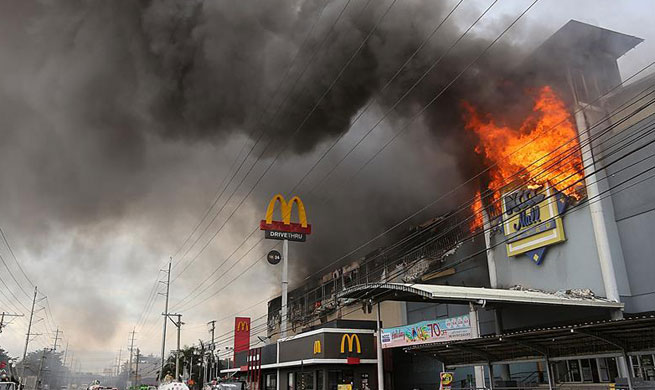by Abu Hanifah
JAKARTA, Dec. 24 (Xinhua) -- Corruption remains a serious problem in Indonesia with scores of senior officials and parliament members arrested in the past year by the nation's anti-graft commission (KPK) as the government steps up its measures to tackle the issue.
The nation's struggle to eradicate corruption has been an uphill effort as the illicit practice of stealing money from the state has been rampant and systematically conducted in state institutions.
A rising number of arrests and legal proceedings against corrupt officials and lawmakers over the last few years, however, has seemingly not provided enough of a deterrent for officials to stay away from corruption.
ANTICORRUPTION DEBACLE
The recent long and weary process of bringing parliament speaker Setya Novanto to justice over a scandalous corruption case he committed, has illustrated how serious the issue is in Indonesia and how steep the uphill struggle is to tackle it.
Despite his distinguished post in the country that required him to be a role model and respect the supremacy of law, Setya demonstrated his defiance by filing an appeal against the allegations leveled by the KPK in July and made a political attempt to rebuff the KPK by having parliament form an inquiry task force against the commission.
The latter move incited staunch public criticism of parliament, which once ranked as one of most corrupt institutions in the country.
The public regarded the forming of a parliamentary inquiry task force against the KPK as being an absurd move that ran contrary to the government and the will of the people to totally eradicate corruption in the country.
"This is serious. They used political variables to oppose the nation's anticorruption drive. Instead of facilitating it, the parliament members actually broke the nation's hope of seeing a brighter, corruption-free future," HS Dillon, a member of Indonesia's Anti-Corruption Civil Society, said.
He added that rampant corruption would hinder the nation from advancing further towards becoming a prosperous country.
In addition, Setya also tried several bogus attempts to be absent for KPK questioning after being summoned. His excuses included illnesses and an instance of literally running away from KPK enforcers.
His escape tactics ended up in a dramatic car crash that saw him admitted to hospital last month. Wasting no time, KPK enforcers arrested him in the hospital and immediately detained him in a KPK detention facility.
Setya was charged for committing corruption connected to a project related to national digital ID cards that ran from 2011 to 2013 when he served as parliament member.
He was charged of illicitly reallocating some 2.3 trillion rupiah (about 169.2 million U.S. dollars) from 5.9 trillion rupiah (about 434.1 million U.S. dollars) allocated for the project.
The parliament speaker, who also chairs the nation's influential Golkar Party, finally resigned from his post when he was detained by the KPK, and is awaiting legal proceedings.
Setya's attempts to dodge justice have yet to end. He filed another appeal to a court, asking for help from President Joko Widodo as the trial against him was underway.
He has received no reply thus, and is facing corruption charges which may carry a maximum punishment of life imprisonment.
Along with Setya, the powerful government-sanctioned anti-graft agency has also arrested dozens of parliament members on suspicion of their involvement in multiple corruption cases.
At least 12 governors, 64 regents and majors have already been arrested by the KPK for their involvement in corruption cases since the anti-graft commission formed in 2004.
In addition, the KPK also arrested former ministers and other high-ranking officials on corruption charges during their service tenures.
Legal proceedings against some of them have been concluded with various sentences of up to six years of imprisonment imposed along with the obligation to return the money embezzled to the state.
The most shocking arrest involving an Indonesian corruption case was of Akil Mukhtar, who headed the Constitutional Court (MK) in 2013, the nation's highest legal institution.
The MK chief justice was caught redhanded receiving a bribe amounting to 250,000 U.S. dollars at his official residence. The bribe was related to disputed results of a regional election in Kalimantan. He was sentenced a year later to life in prison.
LENIENCY AND LOOPHOLES
Eradicating corruption has been a focal policy for governments ruling Southeast Asia's largest country over the last several decades.
There has been a drastic surge in the number of arrests of violators since the KPK launched its crackdown in the mid-2000s, with widespread media coverage of the dramatic arrests of high-profile people who were caught redhanded accepting bribes.
Despite the media hullabaloo, however, many of those arrested received only lenient sentences, after being prosecuted, averaging between just four to six years imprisonment. This, despite the maximum legal sentence being life imprisonment.
Legal experts here have maintained that such lenient sentences do little by way of providing a deterrent to the accused to reoffend, or from deterring would-be grafters from illicitly lining their own pockets.
The experts have also highlighted flaws in the law and loopholes that allow embezzled funds to flow out of the country.
Sentences brought against those charged with corruption are not commensurate with the impact their crimes have had on ordinary people in light of the enormity of state funds usually involved, critics have also asserted.
The punishments have also not included social sanctions, essential in deterring such acts from occurring in society, experts have also pointed out.
Such sanctions could involve removing political rights, banning access to certain financial services, as well as the ability to work in the public sector. They could also include a full disclosure of the person's identity in the media, they added.
"Indonesian law is still attached to conventional methods, but needs to be innovative and inventive, in creating punishments against violators," Ramadan Pradiptyo, an executive at the Economics and Business Research Center at Gajah Mada University, said.
Indonesia has ratified the United Nations Convention Against Corruption (UNCAC) through Law No. 7/2006 that allows the nation to be more creative in its efforts to eradicate corruption issues plaguing the country, he added.
DIGITAL BREAKTHROUGH
The current government administered by President Joko Widodo has proposed using digital technology aimed at minimizing the opportunities to commit corruption.
The government has planned to apply e-budgeting, e-planning and e-procurement systems to facilitate administration processes in proposing budgets, development plans and procuring goods for government proposals in the near future.
President Widodo said recently that his administration is now in the process of providing a legal basis for the systems, which are expected to significantly reduce instances of corruption.
Widodo also plans to reform the permission issuance process in authorized institutions, so that the public and business people wanting to obtaining official permission for their business activities are not duped.
Digital technology could certainly help Indonesia tackle corruption, as a lifetime digital footprint would always provide incontrovertible evidence against those seeking to defraud the government and swindle the nation's law-abiding, hardworking citizens.

















